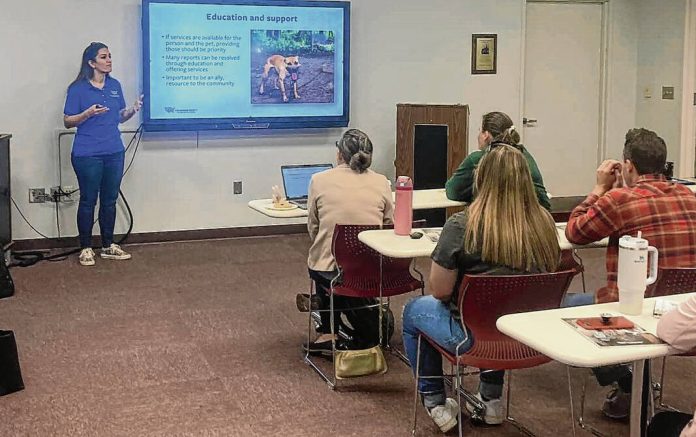The (Columbus) Republic
Few local issues are as emotionally charged as animal welfare, and for good reason. Beyond the community’s concern for the well-being of our four-legged friends, it’s well documented that maltreatment of animals, especially pets, is a near-certain predictor of domestic violence and other crimes.
The Republic’s Mark Webber for years has covered cases involving allegations of animal abuse and neglect as well as local county government meetings where Change 4 Bartholomew County – Animal Advocacy and other concerned citizens have asserted that not enough is being done to protect animals in the community.
So it was refreshing to read about a recent training session believed to be a first of its kind that gathered city and county law enforcement, animal control staff and officials from the prosecutor’s office to get a better understanding of how these agencies can work together to safeguard animals who rely on us humans for their care.
”Organized by Bartholomew County Sheriff Chris Lane and Bartholomew County Prosecutor Lindsey Holden-Kay, the training was provided by two members of the Humane Society of the United States (HSUS) – Animal Rescue Team manager Jessica Johnson and Indiana Director Samantha Chapman,” Webber reported.
“Some of the law enforcement officers seemed surprised at the amount of information about the area of animal abuse that they didn’t know, Lane said.”
Holden-Kay said tension between Change 4 Bartholomew County – Animal Advocacy and county officials didn’t prompt the training, “But I do believe that some of the cases the group has focused on have brought light to an area of our justice system that had some weaknesses,” the prosecutor said.
She pledged to work with Lane and Humane Society officials to address those weaknesses and identify areas where improvements can be made.
This training was an important first step toward such improvements, and we commend Holden-Kay and Lane for bringing it about. The trainers helped local officials better understand where lines are drawn between ordinance violations, which are civil in nature, and criminal acts by owners. “Animal cruelty laws typically cover intentional and egregious animal neglect and abuse,” Webber reported.
This training will help animal control know better what to look for and how to proceed when called to respond to cases of alleged animal abuse or neglect.
The trainers shared some important thoughts about that, too. Chapman, the Indiana Humane Society director, said any successful effort to control the number of animal abuse cases must include education, “… not just trying to vilify folks about their animals.”
The best outcome in any case where animal welfare is in question is protection of the animal, and that does not always require a criminal prosecution. Lane explained it this way:
“My deputies and I are there to follow up if there is a criminal statute to be investigated, but I believe it’s largely up to animal control folks. … This is what they do every day.”
With the training that local official stakeholders have received, they are better equipped to appropriately respond when animals are at risk. That’s a big step forward for the welfare of animals and our community.
The (Columbus) Republic is a sister newspaper to the Daily Journal. Send comments to [email protected].





